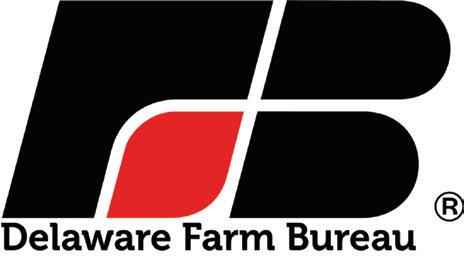

Farm Bureau News
Celebrating 75 Years!
Local Farmers Feeding Your Family
Celebrating 75 years
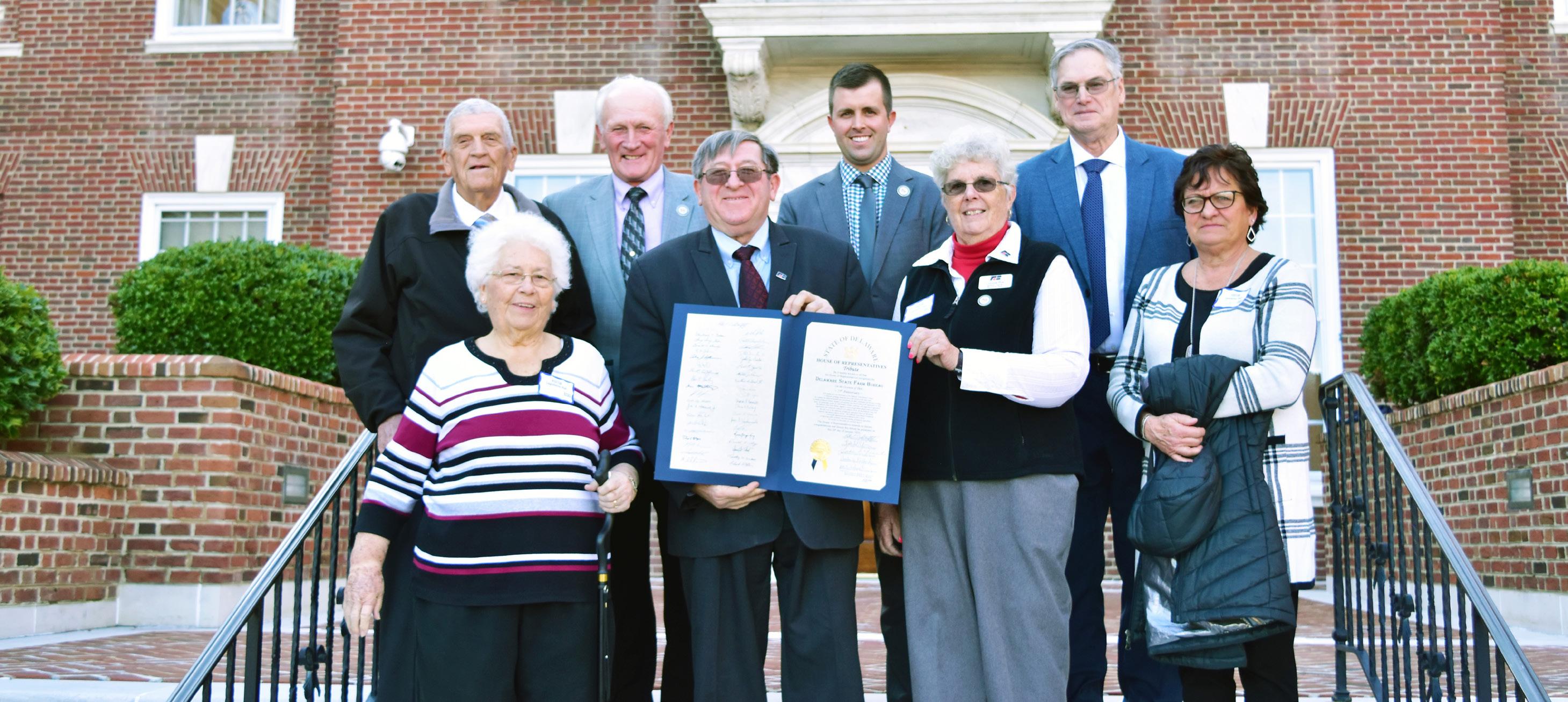
Legislators honor anniversary with tribute
By Jennifer Antonik
The Delaware Farm Bureau accepted a tribute 75 years in the making Wednesday, Feb. 19, honoring the impact and legacy of the statewide non-profit organization.
“The rapidly evolving nature of farming makes the work of the Delaware Farm Bureau more important than ever,” said State Rep. Charles Postles, tribute sponsor and member of the Kent County Farm Bureau’s board of directors. “Representing about 5,800 farmers, ranchers, watermen, and others, the Bureau speaks with a loud voice. It effectively advocates for our interests in Dover, and through our national partnerships, in Washington D.C. as well.”
The tribute, offered by Delaware’s House of Rep-
resentatives, was just one of several tributes given to the group. Delaware’s Senate and the offices of Governor John Carney and Lt. Gov. Bethany Hall Long also offered tributes last year.
“Agriculture remains Delaware's leading sector and contributes approximately $10.5 billion of activity to our State's economy." Delaware Farm Bureau President Richard Wilkins said. "We appreciate this great honor that you bestow upon Delaware Farm Bureau in recognition of our more than 75-year-old legacy. We will continue to lead Delaware agriculture as it travels down the pathway of continuous improvement and the journey of sustainability. Our members will continue to innovate and adapt to the needs of our
CONTINUED ON PAGE 11
Delaware Farm Bureau President Richard Wilkins holds a tribute from the Delaware House of Representatives with Connie Fox, the Sussex County Women’s Committee chair and vice chair for the statewide Women’s Committee. Also pictured here from left to right: DFB members Richard and Barbara Sapp, Senator David Wilson, Rep. Jesse Vanderwende, Rep. Charles Postles and DFB member Kay Betts.
From the President’s desk
Growing from one season to the next with hot topics from the Delaware Farm Bureau
We have been busy at the Delaware Farm Bureau. From the Women’s Committee to the Promotions and Educations Committee and everywhere in between, the Delaware Farm Bureau has been working for you.
In January, we continued to enjoy our 75-year legacy with a legislative tribute presentation in Delaware’s House of Representatives sponsored by our own Farm Bureau member, Rep. Charles Postles. This news was celebrated by local news outlets, as well as, nationally through the weekly Agri-Pulse newsletter. That is only the beginning of what will surely be a busy year for Delaware Farm Bureau.
The first industry-focused advisory council led by Delaware Farm Bureau held its founding meeting Friday, Feb. 7, after the USDA approved Delaware’s Domestic Hemp Production Plan, the second of its kind on the East Coast. This fits well in our mission of advocating and educating our members and the community as we discovered a need for both during our initial discussion.
Those in attendance who grew
Delaware Farm Bureau News
Editor
Jennifer Antonik jenn.antonik@defb.org Graphics/Production Designer
Heather Kline heather.kline@defb.org 302-697-3183
Delaware Farm Bureau News (ISSN 10770798), published in Camden, DE, bimonthly, by Delaware Farm Bureau. Production by Delaware Printing Company. Periodicals postage paid at Camden, DE and additional offices.
Business and Editorial Offices:
3457 S. DuPont Highway, Camden, DE 19934, 302-697-3183.
Any editorial material may be reproduced with credit to this publication.
POSTMASTER: Send address changes to Delaware Farm Bureau News at the office above.
State Board of Directors
President
Richard Wilkins
1st Vice President

industrial hemp last year through Delaware State University’s research program shared their experiences with the crop –the good, the bad and the opportunistic. Together, we discussed the new USDA’s final interim rule and what we need to do to work toward shaping the future of this commodity.
These rulings are crucial developments as we move forward. We must understand where we came from before we think about where we’re going with industrial hemp production. There is a lot of frustration surrounding the stringent rules many think are holding up the hemp industry. However, we must consider that, at one time, we were not allowed to farm this hemp commodity crop at all. The Hemp Advisory Council continues to look forward to working with our farm community to develop an orderly solution to the rules governing the hemp industry.
I have experienced this debate from the federal level to talks with our local farmers. The common thread among all discussions is that we want profitable and safe business environments in which to thrive.
About 15 farmers and community members came out for the first meeting of the hemp advisory group in February. We are looking forward to our next meeting and the opportunities that will result.
Delaware’s approval for the Domestic Hemp Production Program comes on the heels of the USMCA trade agreement which was approved in January by the federal government. The deal, known as the United States-Mexico-Canada Agreement, or USMCA, highlights the importance of the national and
local trade economy and the agricultural industry.
According to the American Farm Bureau Federation, the agreement, which will replace the North American Free Trade Agreement, is expected to increase U.S. agricultural exports by $2 billion and gross domestic products by $65 billion. Canada will increase quotas on U.S. dairy products, benefitting American dairy farmers by $242 million. Canada will also treat wheat imports the same as domestic wheat for grading and pricing as well as permitting greater market access for U.S. poultry products.
Although President Donald Trump signed the deal in 2018 alongside Mexican President Enrique Peña Nieto and Canadian Prime Minister Justin Trudeau, each government needs to ratify the document before becoming law.
The United States Senate passed the measure with an overwhelming majority of 89-10 just days after the United States signed a new agreement with China which will yield more agricultural exports by billions.
USMCA, as passed by the Senate, includes country of origin rules, labor provisions, increased access to the Canadian dairy market for farmers in the United States, an intellectual property and digital trade deal and a sunset clause. Trump signed the USMCA trade deal Jan. 29.
We cannot dismiss the importance of any of the new hemp commodity crop or trade deals for the agriculture industry. The momemtum is shifting for our farmers, even if only small changes at a time. Delaware’s diversified agricultural economy will certainly have the opportunity to make our impact with the new commodity crops and international trade deals.
Delaware Farm Bureau will continue to work hard for the benefit of our farmers and community members. The next few months are filled with exciting events like our fourth annual Ag Safety Conferenceat the Harrington Fire Hall and scholarship application deadlines. Stay informed at defb.org.
Laura Hill
2nd Vice President
William Powers, Jr.
County Presidents
Kent: Jacob Urian
Sussex: Steve Breeding
New Castle: Stewart Ramsey
Young Farmers and Ranchers
State Chair: Teddy Bobola
Kent Chair: Michael Lynch
New Castle Chair: Travis Voshell
Women’s Committee
State Chair: Mary B. Gooden
Kent Chair: Rebecca Bobola
Sussex Chair: Constance Fox
New Castle Chair: June Unruh
Kent County Directors
Ted Bobola Jr.
Paul Cartanza Sr.
David Marvel
Sussex County Directors
Alan Bailey
Mark Davis
Herb Wright
New Castle County Directors
Bruce Patrick
Will Powers III
Ryan Greer




Delaware Farm Bureau President Richard Wilkins
19th Annual MidAtlantic Women in Agriculture conference brings more than 200 attendees to Delaware
By Carol Kinsley
The 19th annual MidAtlantic Women in Agriculture regional conference held recently at Dover Downs drew an audience of 220, mostly women, to learn about a variety of topics from soil health to labeling products to tax breaks.
Delaware Farm Bureau was among 31 exhibitors that encircled the main meeting hall.
First on the agenda were keynoters Helaine Harris and Nancy Staisey of the Historic Lewes Farmers Market. They discussed some of the practices that have made the market, now in its 15th season, the largest producer-only market in Delmarva. The market has 100 volunteers, attracted 54,000 visitors last year and grossed $875,000 in 2015.
Harris and Staisey outlined some of the experiments they have conducted in order to learn how to increase sales and attendance. One idea that worked well was to put photos on freezers or coolers that otherwise might be overlooked. Photos increased sales 33 percent in one test. “Meet the Farmer’ sessions had little impact the same day, but increased sales for the featured farmer at the next market and thereafter.
A test of social media vs. newspaper advertising used two different phrases, one for each medium, to entitle a customer to an extra ticket in a raffle. Market organizers were surprised that ads in the local newspaper were most effective. The large number of retirees in the area no doubt played into the results, they said.
Attendees then dispersed into one of four break-out sessions. There were was a total of 15 sessions to choose from throughout the day, with no repeats.
Those with livestock could learn about forage sampling and analysis. Roxanne Wolf of Shore Gourmet discussed starting, growing and diversifying niche crops. Ashley Winterstein shared how her mobile petting zoo and pony rides has grown to more than 60 farm animals with field trips, camps, parties and live nativities part of

Farm Bureau staff
ad in the
Farm Bureau News and reach nearly 5,800 members!
the Delaware Farm Bureau at (302) 697-3183 or email the editor at jenn.antonik@defb.org for more information!


Delaware
members Kali Voshell and Heather Kline were present at the conference to
benefits with attendees.
Women's Committee donates to Code Purple shelter
Delaware Farm Bureau Women’s Committee donated needed items to the Code Purple shelter at Wyoming United Methodist Church in Camden in February. Items shopped for by committee members and later donated fulfilled clothing and food needs and included things needed frequently by the shelter which serves homeless men in the area. Code Purple at Wyoming UMC opens overnight as needed when temperatures reach 32 degrees or below and provides guests with a dinner and breakfast, bed, clothing and toiletries to name just a few offerings.
Wyoming United Methodist Church is located at 216 Wyoming Mill Road in Dover. Pictured to the left include DFB Women’s Committee Chair Mary Gooden and Melissa Mann of Wyoming UMC. The Delaware Farm Bureau can be found online at defb.org.

DFB visits Women in Agriculture Conference...
CONTINUED FROM PAGE 3
the lineup of events. Experts from the University of Maryland discussed the basics of planning for farm succession. An ag economist from Virginia Tech talked about labels and how to use them to communicate quality and value.
The second set of break-out sessions offered information on how to prepare for a FSMA Produce Safety Rule inspection; how to garden smarter, not harder with the right tools; a first-hand story of how a Delaware farmer navigated all the rules for on-farm processing; advice on important financial steps to take when you’ve had a bad year; and an overview of the Farm to School initiative in Delaware.
Keynoter after lunch was Kelly Phillips Cox of Tilghman Island, whose family goes back five generations of watermen who lived and died on the Chesapeake Bay. She now focuses on oyster recovery. In the 1890s, she said, 15 million bushels of oysters were harvested from the bay. In 2012, the harvest was 168,000 bushels. Cox buys 2 million oyster spat at a time which arrive in a coffee filter
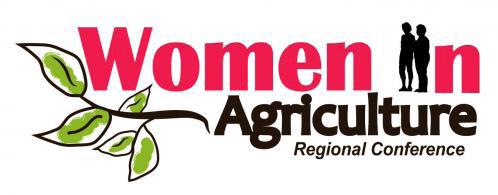
inside a plastic container. She adds water in April, grows them out for two weeks, then sells them to other aquafarmers or plants them in her own cages to raise for her “Fisherman’s Daughter” brand. Cox showed photos and shared how the oysters are grown.
The final break-out sessions included an update on the latest methods for monitoring and improving soil quality; an opportunity to try yoga as a movement and stress management tool; and a session to help attendees think differently about their brand and learn what tools are available to help them get started in creating a brand. Lisa Hastings of Faw Casson was on hand to talk about how
Tax Reform has impacted agricultural accounting and how farmers can make the most of it. Finally, two sisters-in-law, Taylor Vanderwende and Morgan Messick Vanderwende, talked about their involvement in an ice cream business that has expanded from the home farm on Route 404 to four locations and now, a wedding venue in a remodeled dairy barn.
The closing keynote address by Beth Brewster of Chesapeake Culinary was on connecting agriculture and the community. Not your typical lunch lady, Brewster has gone all out to get fresh, local food for students in Caroline County, Maryland, schools. She outfitted a donated bus to take a mobile farm-
ers market into food “deserts” and to do summer meals. She is now working on a project in which inmates of a detention center are being taught to grow food, building on the “Farming for Hunger” project in Charles County.
“Women are vital to our success,” proclaims the conference program. In Delaware, where agriculture is the No. 1 industry, 33 percent of farmers are women.
There are 1,259 women farmers in the state, farming 187,769 acres, according to the Delaware Department of Agriculture.
If you missed the Women in Ag conference, you may be interested in webinars being offered the second and fourth Wednesday of each month at noon. These hourlong sessions are free and open to everyone. Coming up are webinars on “Smart Phone Movies,” “Health Care in your Senior Years,” “Invasive Insects: Impacts in Agriculture” and “Beef Basics: Things to Consider before Starting Your Herd.”
To register, or to see the full list of upcoming as well as archived webinars, visit www.extension. umd.edu/womeninag/webinars.
American Farm Bureau establishes 2020 priorities
Farmer and rancher delegates to the American Farm Bureau Federation’s 101st Annual Convention recently adopted policies to guide the organization’s work in 2020 on key topics ranging from dairy to labor and climate change to conservation compliance.
“Delegates from across the nation came together today to look ahead at issues and opportunities facing farms, ranches and rural communities,” said American Farm Bureau Federation
Vice President Scott VanderWal. “The 2020 policies ensure we are able to continue producing safe and healthy food, fiber and renewable fuel for our nation and the world.”
Delegates also re-elected American Farm Bureau President Zippy Duvall and Vice President Scott VanderWal for their third terms. VanderWal served as chair of the meeting on behalf of Duvall, who is grieving the loss of his wife, Bonnie.
Delegates updated labor and immigration policies, emphasizing that we must see significant changes to the H-2A program. While AFBF has long had policy in place to ensure an accessible, competitive guest worker program, the updates address problems with the adverse effect wage rate and emphasize the importance of year-round program access to all of agriculture. AFBF looks forward to working with Congress on efforts that align with these policy objectives.
After a year-long process to review ways to modernize Federal Milk Marketing Orders, AFBF’s delegates voted to support creation of a flexible, farmer- and industry-led milk management system. This includes giving individual dairy farmers a voice by allowing them to vote independently and confidentially on rules governing milk prices. The new dairy policies, when combined, will form a strong foundation to guide the organization during future reform efforts to better coordinate milk supply and demand in the U.S.
There are significant new policies on conservation compliance. Delegates called on USDA to significantly improve program transparency and due process for farmers. They specifically prioritized changes in USDA’s processes for wetland delineations and the appeals process.
Delegates also adopted a new policy supporting the repeal of Swampbuster provisions. The changes highlight growing frustration with conservation compliance practices within the USDA Natural Resources Conservation Service (NRCS).
Delegates voted to support allowing a higher THC level in hemp, giving AFBF staff the flexibility to engage in discussions with regulators about the appropriate legal level, and to increase the window of time farmers are allowed to conduct THC testing, acknowledg-
Farm Bureau mourns passing of Bonnie Duvall
Bonnie Duvall, wife of American Farm Bureau President Zippy Duvall, lost her courageous battle with cancer Saturday, Jan. 18.
American Farm Bureau Vice President Scott VanderWal released the following statement following her passing:
“It is with deep sadness that I share the news of Bonnie Duvall’s passing after a courageous battle with cancer. She was a special member of the Farm Bureau family, from being chosen for the 1982 National Young Farmer and Rancher Award with Zippy, to her travels with him 33 years later when he was elected president of American Farm Bureau.
“Zippy and Bonnie were partners in every respect for all of their 40 years together. She put her business degree to work keeping the books on their Georgia farm, enabling Zippy to turn his attention to serving his fellow farmers at the county, state and national levels.
APRIL
“At moments like this our faith consoles us, knowing her soul is at peace, having gone on to our heavenly Father. We will forever be inspired by her sense of humor, love of farming and optimism in the face of adversity. She taught us all what it means to make every moment count.
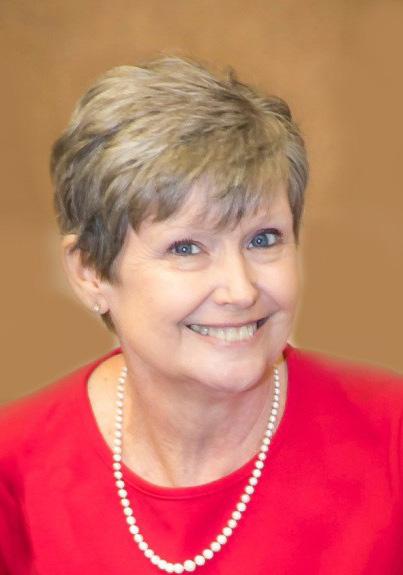
“Our thoughts and prayers are with the entire Duvall family, including the four children Zippy and Bonnie have always been so proud of, Vince, Corrie, Zeb and Zellie, their dear son- and daughters-in-law, and their five beautiful grandchildren.”
ing the many questions about how the testing process will work and the potential for backlogs.
New policies are on the books supporting science-based climate change research and the documentation of agriculture’s tremendous advances toward climate-smart practices. Delegates also made clear they want federal climate change policy to reflect regional variations, and they oppose a state-by-state patchwork of climate change policies.
Beyond policy changes, delegates also elected members to serve on the AFBF board of directors and national program committees.
AFBF President Zippy Duvall and Vice President Scott VanderWal were re-elected to two-year terms.
President of New York Farm Bureau (Northeast Region) David Fisher, President of North Carolina Farm Bureau Federation (Southern Region) Shawn Harding and President of Indiana Farm Bureau (Midwest Region) Randy Kron were elected to fill one-year terms on the AFBF board of directors.
Thirteen other state Farm Bureau presidents were re-elected to two-year terms to represent their regions on the board.
For more information on members for each American Farm Bureau board, please visit fb.org.

Your Generations of Success
Ronald McDonald House stocked by DFB women
The Delaware Farm Bureau’s Women’s Committee went on a shopping spree in February in honor of Food Checkout Week which seeks to celebrate America’s food supply as provided by farmers.
The shopping spree benefits the Ronald McDonald House in Wilmington, helping provide meals and other necessities to families with children admitted to the hospital.
Profits from the DFB food booth at the Delaware State Fair have helped make this trip a success for more than 15 years. Pictured here are Kay Betts and granddaughter Brynlee, Laura Hill, Barbara Sapp, Mary B. Gooden, Connie Fox, Rebecca Bobola and Mollie Lynch.
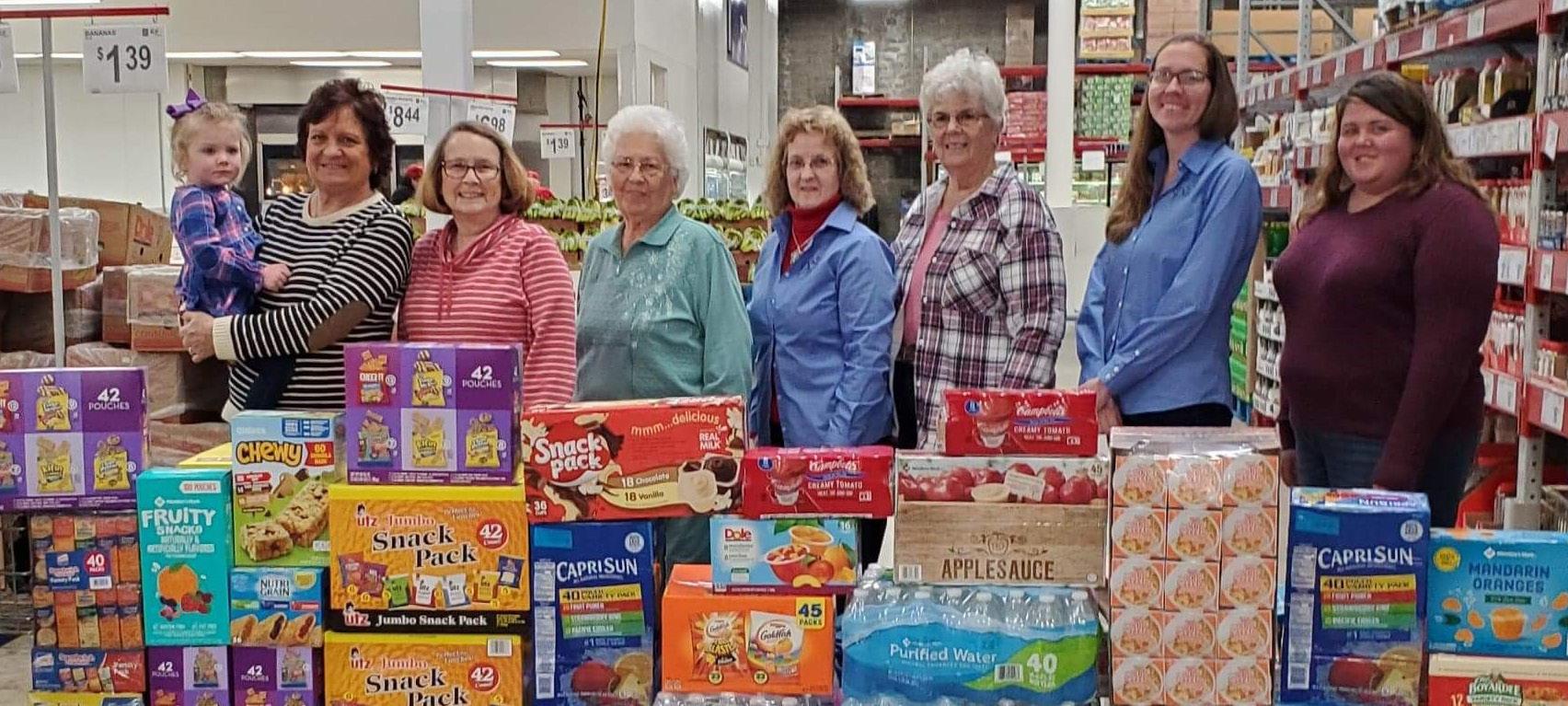
44 Blue Jacket Bonanza awardees announced for 2020
The Delaware Farm Bureau is proud to announce its 2020 Blue Jacket Bonanza winners.
Delaware FFA members can be found learning about the business of agriculture in schools throughout Delaware. The classic blue jackets worn by FFA members are
part of their official uniform and is a tradition that helps the students show off their FFA pride.
“I definitely view the blue jackets as a way of unifying our members into one group or even a family. When people see the blue jacket that has been around for decades,

they feel a sense of pride and unity,” Delaware FFA Executive Secretary Amanda Powell said. “And I think when members are given the chance to get their own jackets, they feel accepted as a part of this family and are proud to wear them with their teammates.”
This year, 44 students will receive jackets from the Delaware Farm Bureau’s Blue Jacket Bonanza Wednesday, March 11, during the annual Delaware FFA State Convention. Since 2015, Delaware Farm Bureau has awarded 291 jackets totaling $17,525.
The blue jackets are awarded based on need, community service, leadership skills and a commitment to the FFA program.
The following students will be awarded blue jackets:
Sussex Central High School
Elizabeth Houseman
Breyden Wright
Katerine Gutierrez
Leilani Brogan
Kailie Olszewski
Rebecca Tripp
MOT Charter School
Karen Netto
Amanda Martin
Daisy Timney
Woodbridge High School
Harley Short
Sabrina Gerving
Thomas Mckean High School
Makayla Bradley
William Penn High School
Harlie Malvezzi
Ardella Webb
Middletown High School
Rylee Albany
Weslee Harkins
Faith Housler
Jacob Green
Ashlee Prall
Reese Albany
Adrianna Mazzio
Emerson Hickey
Anna Kimbel
Seaford High School
Zane Adams
Nathalia Arbaiza
Hannah Moore
Smyrna High School
Isabella McMullen
Alexis McCanney
Sydney Kirch
Evan Denney
Elizabeth Evans
Hannah Everhart
Megan Dinsmore
Faith Hewes
Appoquinimink High School
Keeley McCormick
Caesar Rodney High School
Vanessa Gaines
Madison Arsenault
Joshua Boyles
Abigail Meaney
Gabrielle Frasier
Luis Moreno
Donna Urian
Shelby Serrano
Karissa Hernandez
State of the State: Gov. Carney talks agriculture
Delaware Governor John Carney highlighted the agriculture industry in his annual State of the State address Thursday, Jan. 23, from Legislative Hall in Dover, detailing improvements to high-speed internet access and the ability to secure farmland preservation.
“New investments in our technology infrastructure have already brought high-speed inter-net to the areas around Laurel, Seaford and Bridgeville – where service was spotty or nonexistent,” Gov. Carney said. “This is also helping a family-owned business like Ellis Farms, a poultry and grain busi-
ness in Millsboro. They rely on high-speed internet to collect data and drive farming operations.”
He added that more projects are scheduled to begin in Kent County in upcoming weeks.
“As more and more farmers are using modern technology to enhance their sustainable farming operations, we appreciate the efforts of the state and federal government to ensure those in areas with spotty or nonexistent internet service gain access to dependable broadband, especially in the more rural areas of Delaware,” Delaware Farm Bureau President Rich-
ard Wilkins said.
In his State of the State address, Gov. Carney also thanked the legislators and voters in the room for helping the state continue to preserve farmland.
“We’ve preserved 134,000 acres of farmland,” he said proudly. “Twenty-five percent of Delaware’s family farms are now preserved forever.”
The First State reached that milestone in 2019 as round 23 of Delaware’s Agricultural Land Preservation Program rolled out with a new list of farms enrolled in the efforts. Farmland preserved by
these measures have been selected by Delaware’s Agricultural Land Preservation Foundation which then purchased development rights to the land; landowners continue to own their own property despite participating in this program. That allows the foundation to permanently place an agricultural conservation easement on the property.
“Delawareans and visitors alike take pride in our natural environment – from our beaches, to our inland bays, to our award-winning park system,” he said as he transitioned to other topics during his speech.
New hemp production advisory council created
By Jennifer Antonik
Farmers are organizing a game plan as hemp becomes the newest commodity crop to enter Delaware’s top industry.
Approval from the United State Department of Agriculture for the new Delaware Domestic Hemp Production Program was announced Tuesday, Jan. 28, by the state’s Department of Agriculture, deeming Delaware the second state on the East Coast to receive such an approval.
Delaware Farm Bureau member and local farmer John Foltz said he is supportive of the measure and is looking forward to watching the program grow along with the hemp he has already started to farm through the state’s research program run by Delaware State University. Overtime, he added, the domestic hemp program will give farmers more freedom as it expands.
“The rules that are in place need to be expanded upon in the very near future,” he said. “For right now, I think that Delaware is in a very good position for the Delaware Farm Bureau to work together with our neighboring states, especially being on the Eastern Shore, to allow these businesses to interact across state lines without a whole lot of red tape. The more we lessen that red tape and lessen the rules, the more we will be able to expand.”
Foltz and DFB President Richard Wilkins say the program could serve the state well as it expands the industry which will soon need
hemp processors as production increases in Delaware.
“I think that’s going to be the big nut to crack by needing to have places for these processors to go. I believe that Delaware has a better business atmosphere for that to take place here and it will benefit the whole shore. I appreciate that the Delaware Farm Bureau will be involved in this issue as it develops,” Foltz said.
The non-profit organization, now more than 75 years old, is in the process of organizing the first industrial hemp growers’ group in Delaware which Wilkins hopes will serve as an advisory group for the industry.
“We will continue to endeavor to improve the ability for Delaware’s budding industry to be able to better fill the demand for the beneficial uses of this new, alternative crop,” he said.
The Delaware Domestic Hemp Production Program will be regulated by the state, according to the Deptartment of Agriculture. They emphasized, however, that hemp products manufactured for human or animal consumption will remain under the authority of the U.S. Food and Drug Administration.
Hemp products covered under the program could include textiles for clothing or industrial uses, paper, building materials and other products.
“I want to commend the staff at the Department of Agriculture for putting together a successful plan for smart domestic hemp produc-
tion in Delaware,” Delaware Governor John Carney said. “Not only does this help offer another crop for our farmers to produce, but it provides value-added products that will continue to grow small business in our state.”
Registration materials and participant guides will be released in
early February and made available online at https://agriculture. delaware.gov/plant-industries/ hemp-program.
Farmers interested in participating in the advisory council for industrial hemp growers should contact the Farm Bureau at 302697-3183.
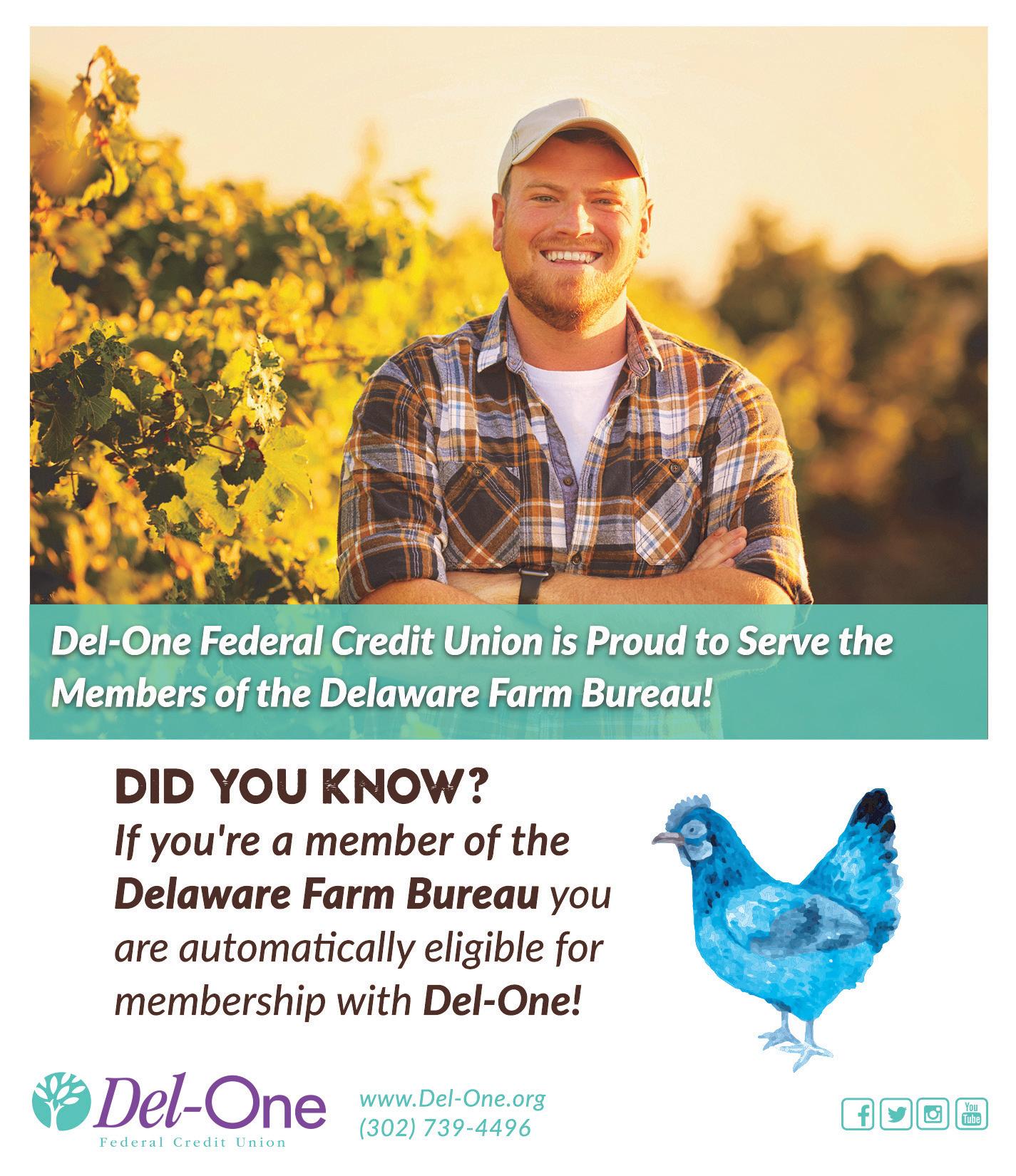
American Farm Bureau Federation addresses stress in farming
Help in Delaware is available
By Joseph Poppiti Executive Director, DFB
The American Farm Bureau Federation (AFBF), in conjunction with Michigan State University, National Farmers Union and Farm Credit, developed a program called “Rural Resilience” to address the increasing stress that farmers, ranchers and their families are confronted with while operating their farms.
Everyday issues can include weather, disease or insect pressure, livestock health, equipment breakdowns, commodity prices, labor issues, long working hours and finances; all of which can all lead to daily stress.
The AFBF’s rural resilience team invited all State Farm Bureaus to participate in a four-hour Rural Resilience online course developed by Michigan State University. After completing the online course work and exams, Delaware Farm Bureau was invited to participate in a one-day workshop entitled, “American Farm Bureau Federation Farm Stress Training.” This






















training took place Friday, Jan. 17, in Austin, Texas, just before the opening of the 101st Convention. In the online coursework, the participants learned to identify the signs and symptoms of stress such as physical, emotional, behavioral, cognitive or chronic symptoms. We learned strategies that can be used to control stressful events and manage the responses to that stress. Stress can affect how your body feels, has an affect on your thoughts and feelings and can affect what you do. We learned that although stress can impact how we feel, think and behave, it is not mental illness.
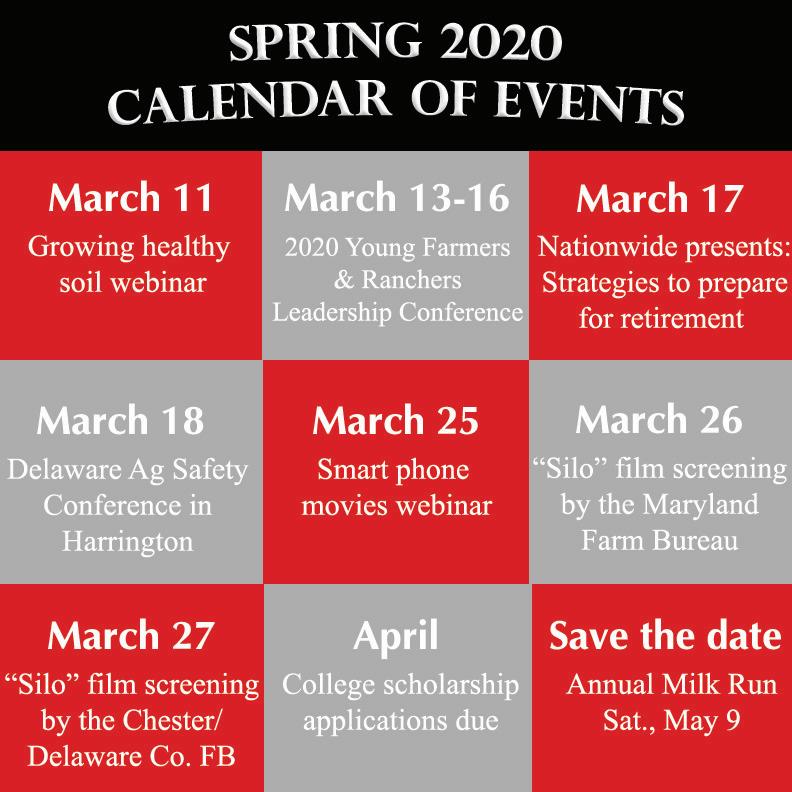
termining what they want to focus on in the conversation.








Another unit of the online course work was focused on the different ways to communicate with farmers and ranchers who share their stressful situations.
The lesson plan taught that communication can be verbal or non-verbal.
Verbal communication follows active listening skills such as asking open-ended questions that begin with what, when, why or how.
• Encouragers are natural responses that can be used to help the farmer or rancher tell their story.
• Focusing involves assisting the farmer or rancher in de-
• Paraphrasing involves feeding back to the farmer or rancher the key points of what she or he just said. Reflection of feelings is similar to paraphrasing that identifies the farmer or rancher’s emotions.
• Finally, a summary technique can be used to condense several messages and help tie her or his thoughts together.
Non-verbal communication can include natural body language that we use every day. Our body gestures or posture, facial expressions, eye contact, and silence are all powerful ways to also show we are actively listening and showing empathy for the farmer or rancher’s story being told.
The last unit of study was on suicide. Someone with high stress has a higher risk of violence toward themselves, not others. Relative isolation in rural areas can also contribute to stress and thoughts of suicide.
There are many risk factors for
CONTINUED ON PAGE 14
Safety Conference to be held in Harrington
The Delaware Farm Bureau is encouraging farmers to “think safety first” through its upcoming annual Ag Safety Conference, featuring topics like grain bin safety and mental health in the field.
The event will take place Wednesday, March 18 from 9 a.m. until 3 p.m. at Harrington Volunteer Fire Company located at 20 Clark St. in Harrington.
Co-sponsored by the farm bureau’s promotion and education committee, Nationwide Insurance, University of Delaware’s Cooperative Extension and the Delaware Fire School, the conference will focus on topics relating to safety while working in the agricultural industry.
Michael Scuse, Delaware’s Secretary of Agriculture, will open the event after breakfast along with June Unruh, chair of DFB’s promotion and education ag safety sub-committee.
Session topics will include farm equipment fires by the Delaware Fire School and stress in farming by Maria Pippidis of the University of Delaware’s Cooperative Extension. Paraquat safety will be taught by Dr. Kerry Richards who will administer a quiz after her presentation and offer certification for participants.
The event will wrap up with a grain bin rescue demonstration by local firefighters. They will use a grain bin rescue tube and other equipment previously donated to the Harrington Fire Department by Nationwide, Staples Insurance Company and Schiff Farms, Inc both in Harrington, with the help of other groups like the Delaware Farm Bureau.
Registration for the Ag Safety Conference is free with breakfast and lunch included at no cost. To register, call the Delaware Farm Bureau office at 302-697-3183.
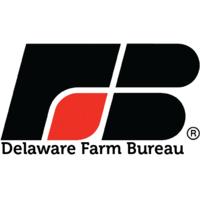


Mental Health First Aid Training

What is this training about? The Mental Health First Aid training is an 8 hour evidence based program that introduces participants to risk factors and warning signs of mental illnesses, builds understanding of their impact, and overviews common ways to help and find support. Using interactive educational methods, you’ll learn how to offer initial help in a mental health crisis and how to connect with the appropriate level of care You will also receive a list of community healthcare providers and national resources, support groups, and online tools for mental health and addictions treatment and support.
Why attend? In Delaware our agriculture community is facing many stressors. Those who are in the position to consult and aid them need to know the signs, symptoms and strategies to best serve them. Farm family members also need to know how best to help their loved ones.
A certificate of completion is provided to attendees who attend all 8 hours of the training
Two Types of Mental Health First Aid Training Offered:
Adults working with Adults – this training focuses on signs, symptoms and support strategies for adults experiencing mental health disorders. This training is being taught by instructors from the Delaware Mental Health Association.
Date Time Location
Town
March 19th 9am-5pm Carvel Research &Education Center Georgetown
April 23rd 9am-5pm Milford Library Milford
May 28th 9am-5pm Paradee Center Dover
June 18th 9am-5pm Farm Services Agency Dover
Adults working with Youth - This training focuses on signs, symptoms and support strategies for youth experiencing mental health disorders. The training is taught by Certified Mental Health First Aid instructor from the National Alliance on Mental Illness in Delaware (NAMI Delaware).
Date Time Location Town
May 11th and 18th 8:30am – 1pm Paradee Center Dover
June 9th and 11th 10:00 am – 2:30 Carvel Research &Education Center Georgetown
Cost for the Training: is $10/person* This covers course materials and, depending on the date of training, a light lunch and/or refreshments. In addition, this training is underwritten by the Sustainable Coastal Communities Project, Delaware Farm Bureau and University of Delaware Cooperative Extension
For more Information and to register go to: www.udel.edu/extension/mhfa
*Scholarships and support for special needs can be provided. For more info, contact Maria Pippidis, Extension Educator, University of Delaware Cooperative Extension, pippidis@udel.edu or 302-831-1239. These organizations are an equal opportunity providers
Meet your farmer: Theodore and Rebecca Bobola
By Jennifer Antonik
Growing up on the family farm, Theodore “Teddy” Bobola, Jr. learned about hard work, committment and the joy in watching something sprout from the ground up.
Now, he and his wife Rebecca get to share those values with their own children on the same farm while advocating for the industry as active members of the Delaware Farm Bureau.
Theodore chairs the Young Farmers and Ranchers Committee, YF&R, and sits on the Kent County Farm Bureau Board. Rebecca volunteers for the YF&R and chairs the Kent County Women’s Committee.
Together, they have two young boys who can often be found playing in the dirt or trying to work on the farm equipment just as their father and his father did at their ages.
“I always say it’s more of a lifestyle, farming, than it is your career. It’s just the way you raise them up and train them to have a love and passion for things and stuff that you enjoy or that I got from my dad,” Bobola said. “Having them out at the farm, they can be outside playing, especially our two-year-old. They like to play outside a lot. They’re not always stuck inside.”
But there’s a fine mix of playtime and work to be found at Bobola Farms just west of Dover.
Rebecca works full-time outside of the farm as a biologist with the state of Delaware, but helps around the family farm when available.
For Theodore, working around the farm is a full-time job and lifestyle. He even earned a college degree in ag business from Delaware State University to help enhance the farm.
“At the family farm, it’s about 1,200 acres. We do corn, wheat, soybeans, small grain. We own about half that; the other half we rent. We have six chicken houses in the back,” Bobola explained. “My mom also has, down front, a full-time florist shop and we have a greenhouse and nursery operation, also.”
While the farm is owned by Theodore and Mary Ellen Bobola, “Teddy’s” parents, the younger Bobolas have started taking on













some of the responsibilty around the farm.
“I do a little bit of everything,” Bobola said. “One of those chicken houses back there, one of the newer ones, is actually mine. Basically, I run the chicken houses. I run ours and then I work in dad’s. I help dad in the fields and a lot on the farming side, doing a lot of the computer work. We got a lot of precision planning going on in our tractors and in the fields. I do all of the planning work on that as far as getting the computers ready and everything and working with dad








as far as getting our compilation and stuff.”
Engaging with the Delaware Farm Bureau has helped Bobola stay aware of issues relating to farming which could greatly impact the work they do at Bobola Farms.
“I think it’s more of an eye opening experience because you really get to see how the process works. If you get the opportunity to sit on your county board and move up, you get the chance to see how politics really works and how laws are implemented or how you’re
going to try to fight against them and negotiating. It really gives you a sense of urgency or awareness of where farming is and where we need to move forward,” he said.
“We’ve been really working hard the last couple of weeks trying to get more young people involved in YF&R. We have a pretty good core group of young farmers in Kent County, but not too many in New Castle and Sussex Counties and there’s plenty of young farmers out there. I really would like to invite anyone in any counties that’s a young farmer or someone who has a passion for agriculture to know that YF&R is good for them. It’s really good to get involved. If we don’t get involved, the next time you know someone is going to come along and tell you how you have to farm.”
To get involved with YF&R or another opportunity at the Delaware Farm Bureau, visit defb.org or call Kali Voshell at 302-6973183.
Teddy and Rebecca Bobola with one of their sons at the Dover Days parade in May 2019.
DFB attends 101st consecutive AFBF Annual Convention & Trade Show
To the right: Delaware Farm Bureau President Richard Wilkins walks the state flag across the stage at the 101st consecutive American Farm Bureau Federation’s Annual Convention & Trade Show held in January in Austin, Texas.
Below: Women’s Committee Chair Mary Bea Gooden smiles with Debbi Tanner, Denise Hymel and Roberta Valladao during the convention.

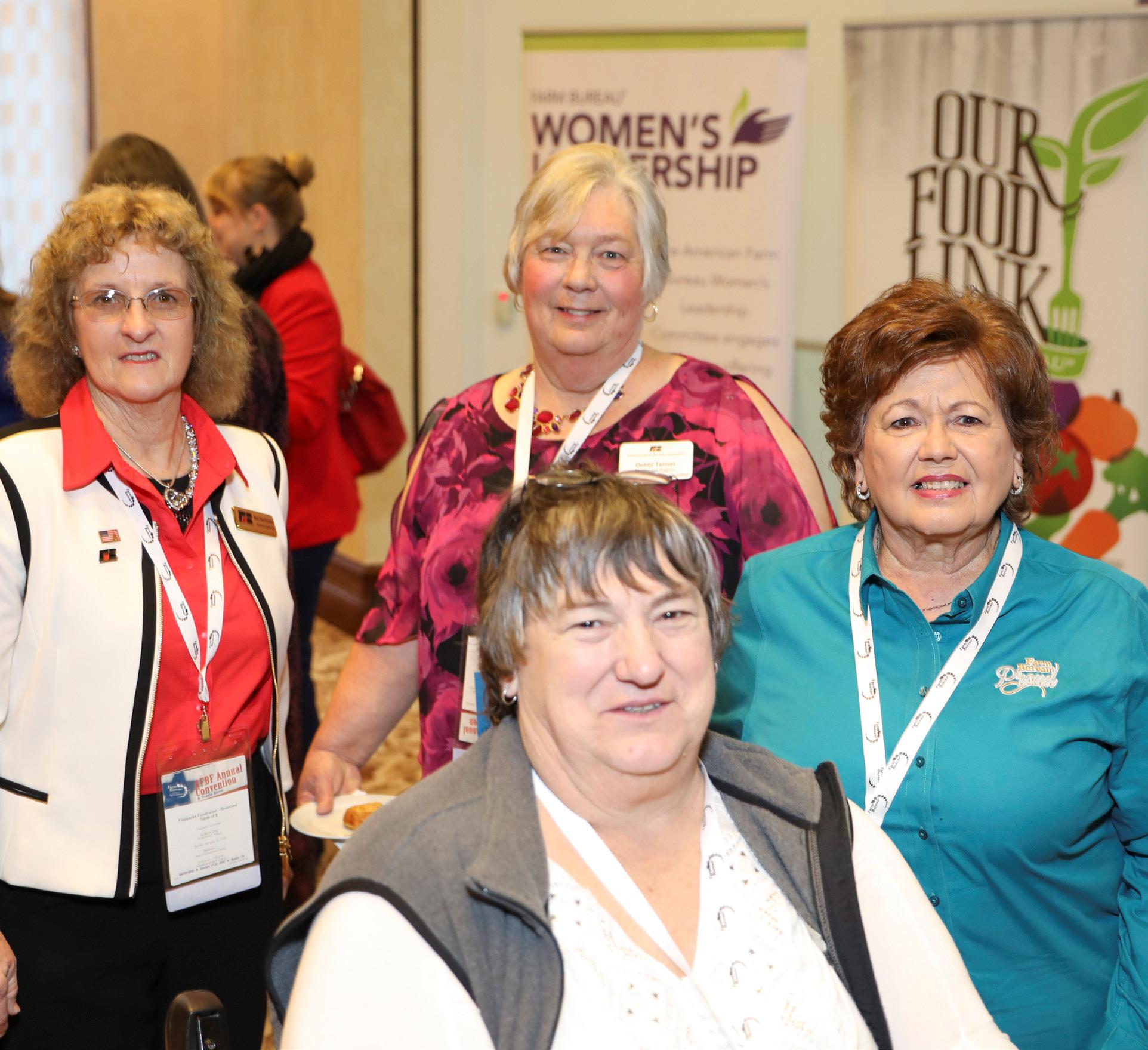
Tribute...
CONTINUED FROM PAGE 1 consumers both here and abroad as we work diligently to expand our contributions to our Great State's character and economy."
Wilkins previously welcomed more than 400 guests to a farm bureau gala in December at Delaware Technical Community College’s Terry Campus in Dover. The event doubled as a chance to honor the bureau’s anniversary as well as distinguished members of the agricultural community.
Barbara Sapp was given the distinguished service to agriculture award after many years of service to the Delaware Farm Bureau and the greater farming community. The Mark Urian Family of Kent County was honored during the event, as well, as the 2019 Delaware Farm Bureau Farm Family of the Year. Top honors also went to Robert Garey, who was chosen as the Young Farmers and Ranchers Committee Supporter of the Year, and Michael Lynch, who was given the Young Farmers and Ranchers Member of the Year Award.
The Delaware Farm Bureau was established in 1944 and has become one of the strongest farm organizations in the First State, providing a unified voice for Delaware’s farmers. It also provides leadership opportunities for young farmers and ranchers, women in the agricultural industry and others. A mobile agricultural lab also brings the industry to some of Delaware’s youngest students.
Visit the Delaware Farm Bureau at defb.org.
Book barns continue to promote ag literacy in Delaware
By Jennifer Antonik
Hand-crafted book barns stocked with “ag-accurate” books headed to several schools in New Castle County in recent months thanks to the Delaware Farm Bureau and passionate volunteers.
The program began in 2015 after local farmer and president of the NCC Farm Bureau Stewart Ramsey saw a similar project run by another farm bureau. In bringing the idea home, his father-in-law came on board to help make the first book barn.
More were crafted by fellow NCC farmer, Jimmy Correll, and Smyrna FFA members; Tom Barthlemeh from Sussex County is in the process of building more.
Grant funds made available last year through the USDA helped speed up the process and afforded the Delaware Farm Bureau the opportunity to purchase “ag-accurate” specialty crop books for the barns.
Over the past year, more than 25 barns have been introduced into schools throughout the state.
Initiatives like these highlight the importance of ag literacy which helps people understand “. . . the relationship between agriculture and the environment, food, fiber and energy, animals, lifestyle, the economy and technology,” according to the American Farm Bureau Foundation’s website.
The national organization takes ag literacy to another level by designating an AFBFA Book of the Year annually.
The 2020 awardee, Peggy Thomas, took the opportunity to combine ag literacy with a splash of history in her book, “Full of Beans.”
“In a nutshell, Full of Beans is the story of how Henry Ford created a car with soybean plastic body parts. That’s the hook; the weird fact to get kids reading. But the fuller story is about Henry Ford’s compulsion to recycle and create sustainable ‘green’ manufacturing. Sounds familiar, right? Many companies are doing the same thing today. I hope young readers will wonder why? Why be sustainable? Why, if we started so long ago, haven’t we figured it out yet,” she writes in a post for the AFBFA website.
“Although it’s technically a historical biography, it is also my way
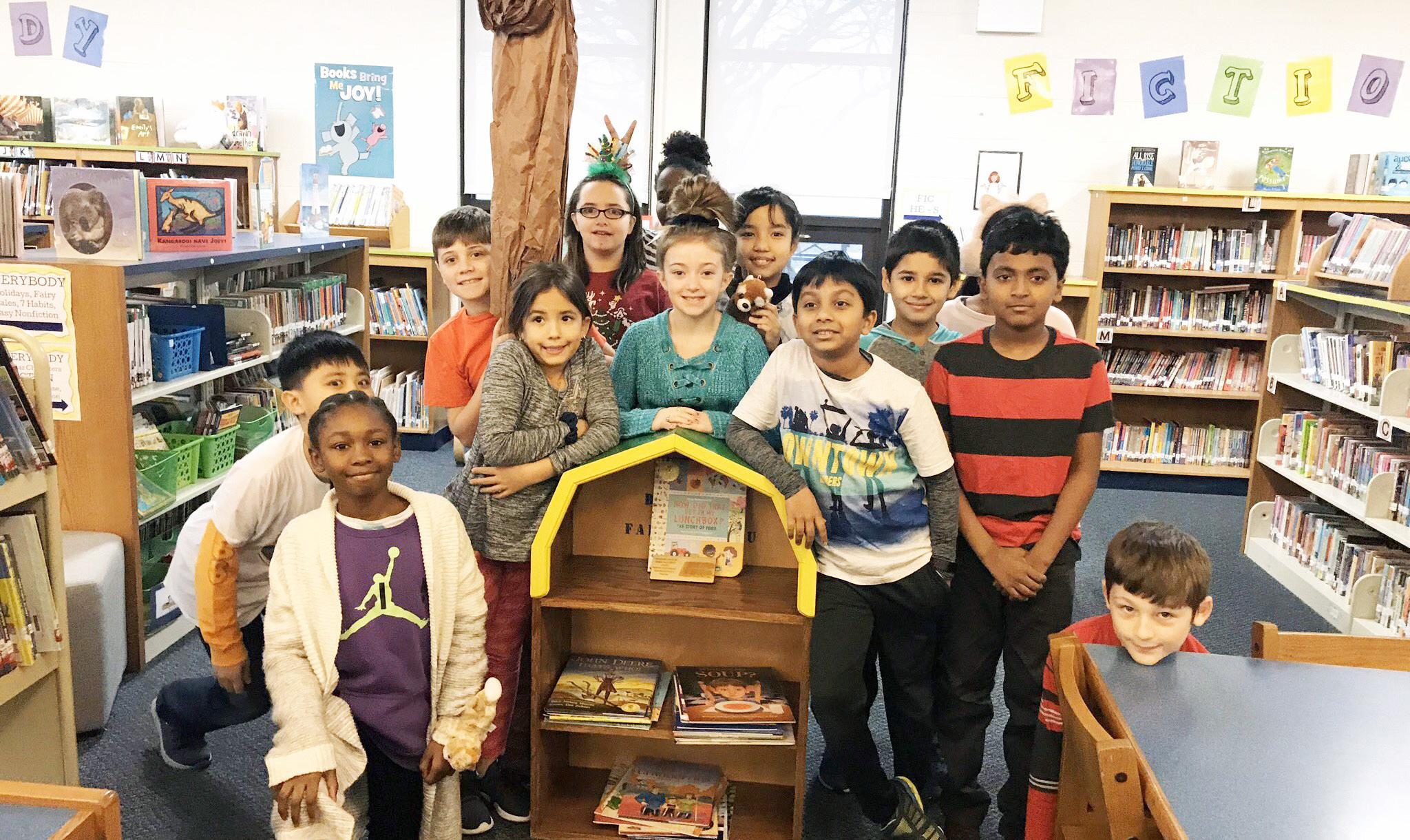
Above: Students from Linden Hill Elementary School in Wilmington of the Red Clay School District stand next to a book barn delivered in December 2019.
To the right: “Full of Beans” by Peggy Thomas is the 2020 AFBFA Book of the Year.
of connecting kids to the larger world around them. For example, when they read the long list of products that contain some part of the soybean, I hope they look around and ask: Is there soy in my crayon? Are there soybeans in my desk? How many soybean products have I eaten today,” she adds.
“Full of Beans” is just one of the “ag-accurate” books found inside book barns given to schools by the Delaware Farm Bureau.
The books and the barns are accompanied by a one-time reading at the school by an agriculture supporter, many times a volunteer who is also a member of the Farm Bureau.
To schedule a reading and book barn delivery at a local school or to sponsor a set of six books for the barns at $60 each set, contact Kali Voshell at the Delaware Farm Bureau office at 302-697-3183 or email her at kali.voshell@defb. org.


Delaware Farm Bureau welcomes PR Coordinator Jennifer Antonik
A new public relations coordinator has been chosen to serve the Delaware Farm Bureau following the retirement of Carol Kinsley, according to Executive Director Joseph Poppiti.
Jennifer Antonik is taking over the reins as the public relations coordinator for the statewide non-profit organization and editor of its newspaper, Delaware Farm Bureau News.

Kinsley has served DFB as the public relations coordinator and editor of the Farm Bureau News since 2016, bringing about 40 years of agricultural writing experience to the organization. She also writes
for the local-based Delmarva Farmer having previously retired from American Farm Publications. Former DFB Board
President Kitty Holtz said, “Carol’s dedication and professionalism will be greatly missed by the Delaware Farm Bureau.”
Kinsley will continue to write for the Delmarva Farmer and be available for assistance at DFB when needed.
“The Delaware Farm Bureau’s staff and members are going to miss the expertise and passion Carol brought to our organization in telling our farming stories. We wish her much success in checking
Annual Milk Run scheduled to benefit local organizations
The seventh annual 5K Milk Run/Walk is headed straight for Dover again this year Saturday, May 9, starting at 9 a.m. Net proceeds from the event benefit the Food Bank of Delaware’s Backpack program and the Ministry of Caring’s Milk for Children Fund.
“The Food Bank of Delaware is proud to partner with the Delaware Farm Bureau on the Milk Run again this year. It is vitally important to have community partners that are supportive of the mission of “ensuring a community free of hunger,” Chad Robinson of the Food Bank of Delaware said.
Participants will begin and end at Buffalo Wild Wings located at 680 Bay Rd. in Dover, Delaware. Registration is $25 per person through May 2 and $30 each after that date. For more, visit https://defb.org/milkrun/.
off her bucket list in retirement,” Delaware Farm Bureau Executive Director Joseph Poppiti said. “We are excited to start this new chapter with Jenn as the Farm Bureau’s new public relations coordinator and editor of the Delaware Farm Bureau News.”
Antonik began the process of transitioning into the role of public relations coordinator for DFB in mid-January and is looking forward to continuing DFB’s legacy while expanding on their opportunities for growth through public communication.
She brings to the table four years of experience as the news editor for The Chronicle based in Milford, Delaware and reporter for the Delaware State News. She has an associate degree in communi-
cations technology from Delaware Technical Community College, or DTCC, and is working toward a bachelor’s degree in communications, with a concentration in integrated marketing, from Wilmington University. She also has a certificate in American Sign Language technology from DTCC. She and her husband live in Magnolia with their three children.
DFB was established in 1944 and has since become one of the strongest grassroots farm organizations in Delaware.
With more than 5,800 farm families and farm community members, the organization works to promote the needs and expertise of agriculture professionals from around the First State.
Maryland advises motorists of bridge lane width reduction
As planting gets underway for many local farmers, the Maryland State Highway Administration wishes to advise farmers of a lane width reduction on the bridge on MD 273 (Telegraph Road).
The bridge, located over Big Elk Creek in northeastern Cecil County, has been reduced to a single 11-foot-wide lane. All motorists, particularly commercial haulers and farm equiptment operators, are urged to make sure their vehicles can fit before proceeding onto the bridge.
This temporary lane width reduction is part of a Maryland Department of Transportation State Highway Administration project to replace the bridge while maintaining traffic through all construction phases.
For more information or the latest transporation news in Maryland, visit the department online at http://www.mdot.maryland.gov/.

White-Reinhardt grant awarded to Kent County Farm Bureau
By Carol Kinsley
Kent County Farm Bureau is one of 10 recipients of $1,000 each from the White-Reinhardt Fund for Education which recognizes the outstanding agricultural literacy efforts of educators and communities across the country.
A total of $25,000 in scholarships and grants was given recently to build on their work to connect students with how their food is grown.
The grant will go to University of Delaware Cooperative Extension’s 4-H Embryology Program which teaches embryology in kindergarten through 2nd grade classrooms throughout Kent County. Grant monies will be used to upgrade the incubators used.
Kristen Cook, 4-H youth development educator, said, “This is so awesome, and I know the teachers are going to be so excited to use the new (digital) models.
In doing some test runs and learn-
ing about the new incubator, we have seen the hatch rates increase from an average of 60 to 65 percent to closer to 90 to 95 percent. While this may seem minor, it is a huge improvement on the old model and will improve the experience for the participants even more.”
Cook said the older models would be retained “to slightly expand our reach within staffing limitations but mostly as back up incubators as the need arises.”
The White-Reinhardt Fund for Education is a project of the American Farm Bureau Foundation for Agriculture, in cooperation with the American Farm Bureau Women’s Leadership Committee.
The fund honors two former committee chairwomen, Berta White and Linda Reinhardt, who were trailblazers in early national efforts to expand the outreach of agricultural education and improve agricultural literacy.
Applications for the mini-grants
Mental health in farming...
CONTINUED FROM PAGE 8
suicide including losing someone to suicide, the loss of a friend or family member, feeling trapped, a physical illness, history of substance abuse or a lack of willingness to seek counseling.
The course work also outlined some warning signs of suicide such as talking or writing about suicide or death, feeling hopelessly trapped or a burden to their family,
giving away prized possessions, saying goodbye, isolation, loss of interest or mood changes.
The one-day workshop in Austin, Texas, reinforced what was taught through the online course work from Michigan State University.
Over 35 staff members from state Farm Bureaus throughout the country met in person to discuss how to facilitate discussions around farm stress and suicide.
Five respected professors from

are accepted in October and April.
Cook was exuberant in expressing her gratitude to the White-Reinhardt Fund and the Foun-dation for making this possible.
She relayed one success story from a teacher who wrote, “The children’s interest in this science experiment was the most engaging of any we’ve done all year. They were able to verbally explain the steps of the life cycle of a chicken, describe the steps of how a chick hatches, learned empathy, how to care for a living thing and describe similarities and differences between the chicks.”
The Foundation also awarded 10 teachers and classroom volunteers with $1,500 scholarships to attend the National Ag in the Classroom Conference, to be held in Salt Lake City, Utah, June 23 through 26.
For more information on the White-Reinhardt grants, contact Kali Voshell at the Delaware Farm Bureau, (302) 697-3183.
South Dakota State University, the University of Illinois, Michigan State University and the University of Wisconsin were our facilitators for the day as we broke out into small groups for shared perspectives of rural stress.
Fellow Farm Bureau staff members in my group were from Texas, New Mexico and Arizona. The wide-open spaces of rural America in these states can lead to additional stress from isolation; different from most of Delaware.
The goal of this awareness initiative on Rural Resilience by AFBF was to help Farm Bureau staffs become educated resources for our agricultural community to help our farmers and ranchers who may be in stressful situations or possibly contemplating suicide.
As AFBF Rural Resilience Team Coordinator RJ Karney emphasized, this workshop was not intended to develop front line care givers to our farmer and rancher members; that is not the mission.
However, since many Farm Bureau staffs interact one on one with their membership, AFBF wanted to provide tools for discussing stressful
Legislative updates to be given in March
The Delaware Farm Bureau will host several events across the state to update members on legislative issues that could impact farmers and consumers.
The first event took place Friday, March 6 at Hollywood Grill in Wilmington at 8 a.m. and included a complimentary breakfast. Future events include:
• Friday, March 13, 9-2 p.m.: Enjoy a New Castle County Farm Bus Tour with boxed lunches provided. RSVP to Kali Voshell at 302-6973183 or kali-voshell@defb. org.
• Friday, March 20, 8 a.m.: Visit Mulligan’s Pointe in Georgetown for a complimentary breakfast.
• Friday, March 27, 8 a.m.: Start your morning with a complimentary breakfast at Countrie Eatery in Dover.
situations with our members. As we returned to our states after the convention, our homework was to find the local resources in our states so our Farm Bureaus could help farmers and ranchers deal with stress and thoughts of suicide.
In Delaware, Maria Pippidis, New Castle County director and extension educator for the Family and Consumer Sciences at University of Delaware’s Cooperative Extension, is hosting “Mental Health First Aid Training” in the next few months.
This is her second year of training workshops and, because of demand, this training has grown to eight sessions/dates at four different locations. This year, Delaware Farm Bureau is a sponsor for these training events.
As in past years, farmers and ranchers are welcome. Pippidis said that farmers and ranchers who have attended in the past are amazed at the resources available to them in Delaware. She also commented that front line case workers were equally amazed at the many stressful situations farmers and ranchers face every day.
From Century Farm to CEO: Nationwide’s new leader credits farm roots for path to success
It’s 6 a.m. on a crisp autumn morning as a young Kirt Walker finishes the last of his chores, tending to a barn full of livestock before breakfast, then school.
Growing up on his family’s Century Farm in Iowa instilled the values of hard work and responsibility that Walker carries forth today in his new role as CEO of Nationwide.
“I wouldn’t be here if it weren’t for farming,” says Walker. “Ag runs deep in my family, through farming and other related professions for more than 100 years.”
As an active youth member of 4-H and FFA followed by the Block and Bridle Club at Iowa State University, Walker honed valuable leadership and business skills, along with a focus on personal growth and development.
“My brother and I were officers in 4-H and FFA, and my dad was a 4-H leader for more than 20 years,” shares Walker. “Those experiences helped me understand that leadership is ultimately about serving others.”
As he accepts responsibility for the reins guiding Nationwide, Walker says, “Nationwide will evolve for the future, but our relationship with the Farm Bureau and the agricultural community will remain a vital part of our foundation. Organizations like the Farm Bureau helped build Nationwide into the company we are today.”
Nationwide’s earliest roots were established in 1926 by the Ohio Farm Bureau when it founded the Farm Bureau Mutual Automobile Insurance Co. that eventually became Nationwide. “We were started by farmers to support rural communities, and we’ll always honor that heritage,” says Walker. Nationwide’s first salespeople and customers were farmers who believed in the cooperative spirit of the company and that more could be accomplished together than alone.
Walker says that belief still drives the company, but its much broader product offerings allow it to offer even more protection today. “Nationwide protects people,

businesses and futures, and something that makes us special is the extraordinary care we bring to that mission.”
Walker points to Nationwide’s commitment to farm safety. The company established Grain Bin Safety Week in 2014 to raise awareness about the dangers of grain bins. Since that time, Nationwide has provided lifesaving grain rescue tubes and training to 111 fire departments across 26 states. “It’s important to give back to rural communities by helping people protect what matters most. Nothing is more important than people,” he says.
Nationwide is the largest insurer of farms and ranches in the U.S., but Walker sees an opportunity to do even more for the agricultural

community by innovating and offering new solutions. “We’d like to be the number one financial services provider for farmers and ranchers across America,” says Walker. “Too often, retirement planning and farm succession planning take a back seat to the day-to-day realities of managing a farm.” Nationwide is working to
change that through programs like Land As Your Legacy® and Your Ag Financial Legacy℠. “At the end of the day, farming is a part of who we are as a company,” affirms Walker. “Our relationships with Farm Bureaus across the country are among the most important partnerships we have. That will never change.”
Nationwide CEO Kirt Walker with his favorite vehicle (his dad’s farm truck).
